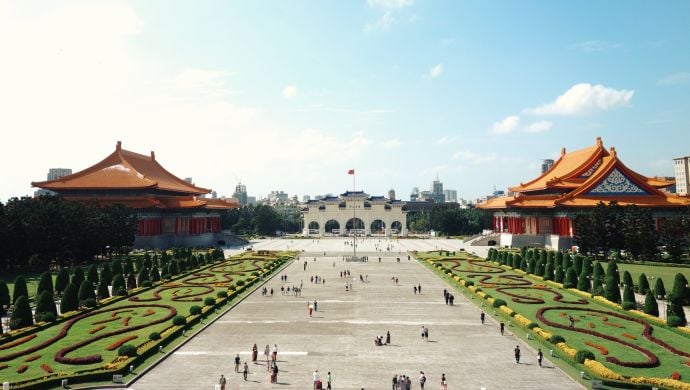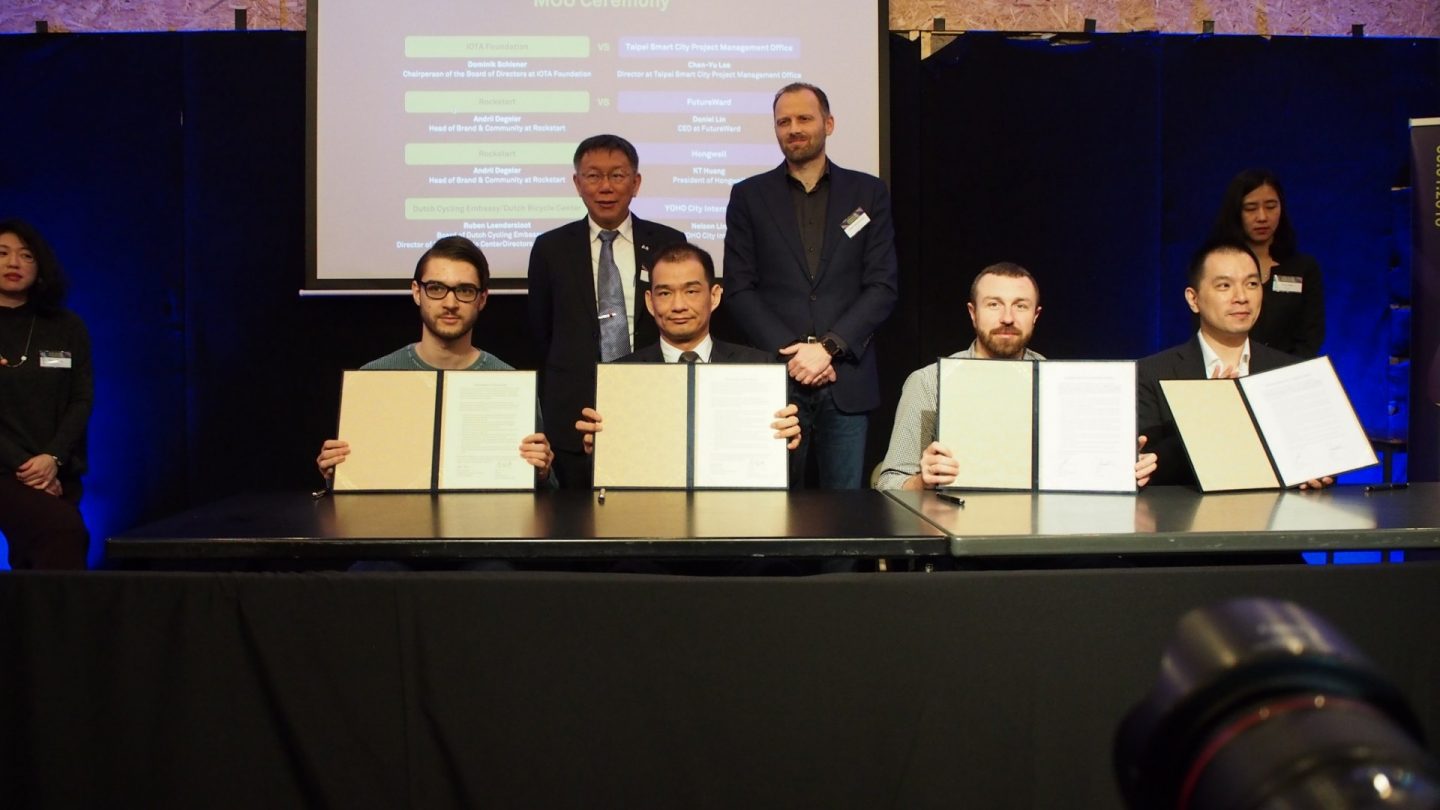While many look to blockchain hoping it will be the technology to provide the underlying support for the machine economy, it is not very scalable

Image Credit: Rovin Ferrer on Unsplash
This article Taipei is using a blockchain alternative to transform into a smart city by Nicole Jao originally appeared on TechNode, the leading English authority on technology in China.
We are living in the age of the Internet of Things (IoT) where resources, data, and services are increasingly being traded between machines. As connected devices continue to proliferate, the interoperability and sharing of resources —everything from information, storage to electricity and sensor data— are a vital part of the machine-to-machine economy.
While many look to blockchain hoping it will be the technology to provide the underlying support for the machine economy, it is not very scalable. That is what the creators of IOTA wanted to solve. Although better known as a cryptocurrency, IOTA was intended to be something much more ambitious—to be the backbone of IoT.
Instead of using a blockchain, IOTA is based on a distributed ledger technology called a Directed Acyclic Graph (DAG), or Tangle, that enables data and money to be transferred via its network. Unlike blockchain, for every transaction that is added to the Tangle, two others are validated, which means the Tangle network doesn’t slow down with high transaction volume. The technique makes IOTA capable of handling large volumes of transactions per second.
“You want to ensure the data is completely tamper-proof and that is what any distributed ledger can bring. But IOTA can bring it in a unique way in the sense that it doesn’t get inhibited by fees and scaling limitations like regular blockchains,” said David Sonstebo, the co-founder of IOTA.
These characteristics make IOTA much more future-proof than blockchain, they claim. And because IOTA works particularly well in payments and storing information, there are already a number of known applications including micro-payments, voting, as well as information and data transfer. IOTA is already being tested on industries including automobile, manufacturing, and healthcare.
Just recently, Bosch —German electronics giant and leading IoT patent holder— became one of the first multinational firms to invest heavily in IOTA. Volkswagen announced in January that the Chief Digital Officer, Johann Jungwirth, is joining the Foundation’s Supervisory Board, a hint that further collaboration with IOTA on decentralised platforms and smart cars will take place in the near future.
Also Read: Blockchain startup Cashaa enables instant P2P international transfer between fiat and cryptocurrency
The city of Taipei is testing Tangle on smart city solutions
In January, Taipei signed a partnership agreement with the Germany-based IOTA Foundation to explore smart city solutions based on Tangle. The city has already launched a number of projects including digital identification and air quality monitoring systems. Taipei has become one of the first cities in the world to test out IOTA.
“A lot of people probably have the notion that blockchain technology is universal, but it’s not,” said Lman Chu, the co-founder of Biilabs, a startup looking for a better smart city solution than blockchain. The Taiwan startup is collaborating with the Taipei City government and working with the IOTA Foundation to provide the core technology for the smart city projects.
“IoT devices are expected to reach 50 billion by 2020, with an estimated 50 trillion interactions per day,” said Lman. “The existing blockchain technology that we have now can’t possibly deal with a transaction volume this large,” he said, adding that they are not the only ones who noticed the scalability problem.
The initial project is to put in place a digital identification system based on IOTA’s TangleID technology. As Taipei’s Smart City Living Lab initiative enters its proof-of-concept phase, the city will soon roll out a new identification system—the Digital Citizen Card —that is designed to safeguard citizens from identity theft and voter fraud. The identification system could eventually be used in other public service domains such as tracking medical history.
The TangleID system solves a common conundrum relating to digital identification—linking digital identity with the non-digital identity of a real person. Mainland China is a rare exception to this type. It has been enforcing the controversial real-name registration laws, which mandate internet companies and service providers to request and verify real names from users when they register.
Also Read: Beijing to set up standard organ for blockchain and distributed ledger technologies
Outside of China, this is still a very big problem.
Lman said the process of verifying whether online information corresponds to the actual person is necessary but very difficult. That is why, as a preventative measure against money laundering, financial service providers still need something like the KYC (Know Your Customer) forms to identify and verify its clients’ identities, Lman explained. When the technology is implemented, citizens will have the option of linking their Digital Citizen Card with different forms of digital assets such as medical records and household registration records.
In a joint effort to better control air quality, Asus, Academia Sinica, Edimax, Realtek, LASS (Location Aware Sensing System), and the Taipei City government are using Airbox‘s palm-sized air sensors that collect air quality and pollution data. They will be installed in schools and homes to enable real-time air pollution monitoring. In collaboration with Biilabs, Airbox will integrate incentivized payment in IOTA and the data will be stored in the Tangle.
Lman told TechNode they are testing Tangle in other areas he cannot disclose just yet.

Taipei city and IOTA Foundation MOU signing ceremony. Image Credit: IOTA Foundation
Also Read: 4 ways blockchain are revolutionising the travel industry
First time to adopt Tangle at scale
Taipei is not the first city to adopt IOTA-based smart city solutions. In fact, the city of Haarlem in the Netherlands is the first to implement Tangle for smart city solutions using the technology to verify legal documents within public registers.
But why is the Asian capital under a bigger spotlight?
“The attention didn’t come as unexpected,” Lman recalling a conversation he had with the founding team of IOTA, “We knew this would be something significant because this is the first time the technology is being tested on a big city and this is critical to the adoption IOTA technology this time around.”
The Asian city is ranked the 40th most populous urban region in the world. Taipei City and the Greater Taipei region (Keelung and New Taipei) combined have an estimated population of over 7.4 million.
With Taiwan’srich history in hardware manufacturing and electronics, IoT is considered is a strategic economic area for the island. In the next decade, government policy and budget surely will favor the IoT sector, Lman said. This is a favorable position to be in, “because the government is the biggest spenders on IoT, and this is true in across the world.”
Taiwan has rolled out initiatives to promote the development of IoT. For example, theAsia Silicon Valley Plan launched in December 2016 aims to promote the IoT industry innovation. These factors created a fortuitous opportunity to push forward IOTA adoption.
Laying the groundwork
Despite it playing a pivotal role in the smart city evolution, it is still a relatively new technology that many are unfamiliar with. Blockchain and distributed ledgers are difficult concepts to understand. To push IOTA forward, Lman said communication is key. “The biggest challenge is in communicating with the general public and promoting the concept. The technology is not really the knotty problem here.” Now, Biilabs is focusing on developing and bolstering their core technology. Lman revealed that they have seen interest coming from other cities in Taiwan, and cities in Europe and the US.
“IOTA and blockchain, to be honest, are trying to solve the same old problems as the technologies that came before them,” Lman said. “Can IOTA solve real-world problems? Can it help our industries cut costs and function more efficiently?”
These are the fundamental questions that are driving the innovations of smart cities, smart health, smart-everything—and IOTA is no exception.
—
The article Taipei is using a blockchain alternative to transform into a smart city first appeared in TechNode.
The post Taipei is using a blockchain alternative to transform into a smart city appeared first on e27.